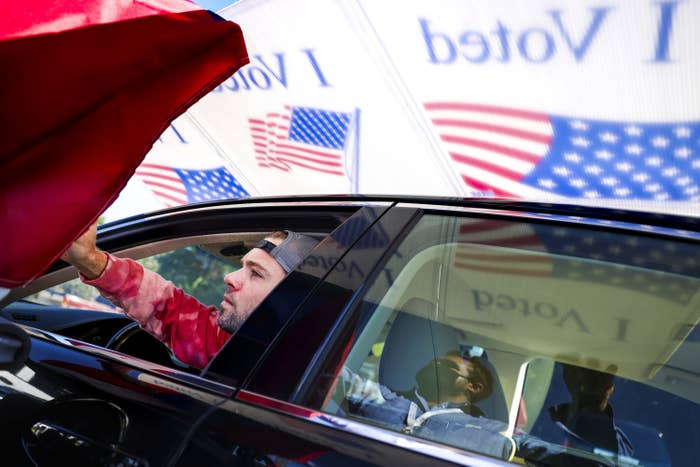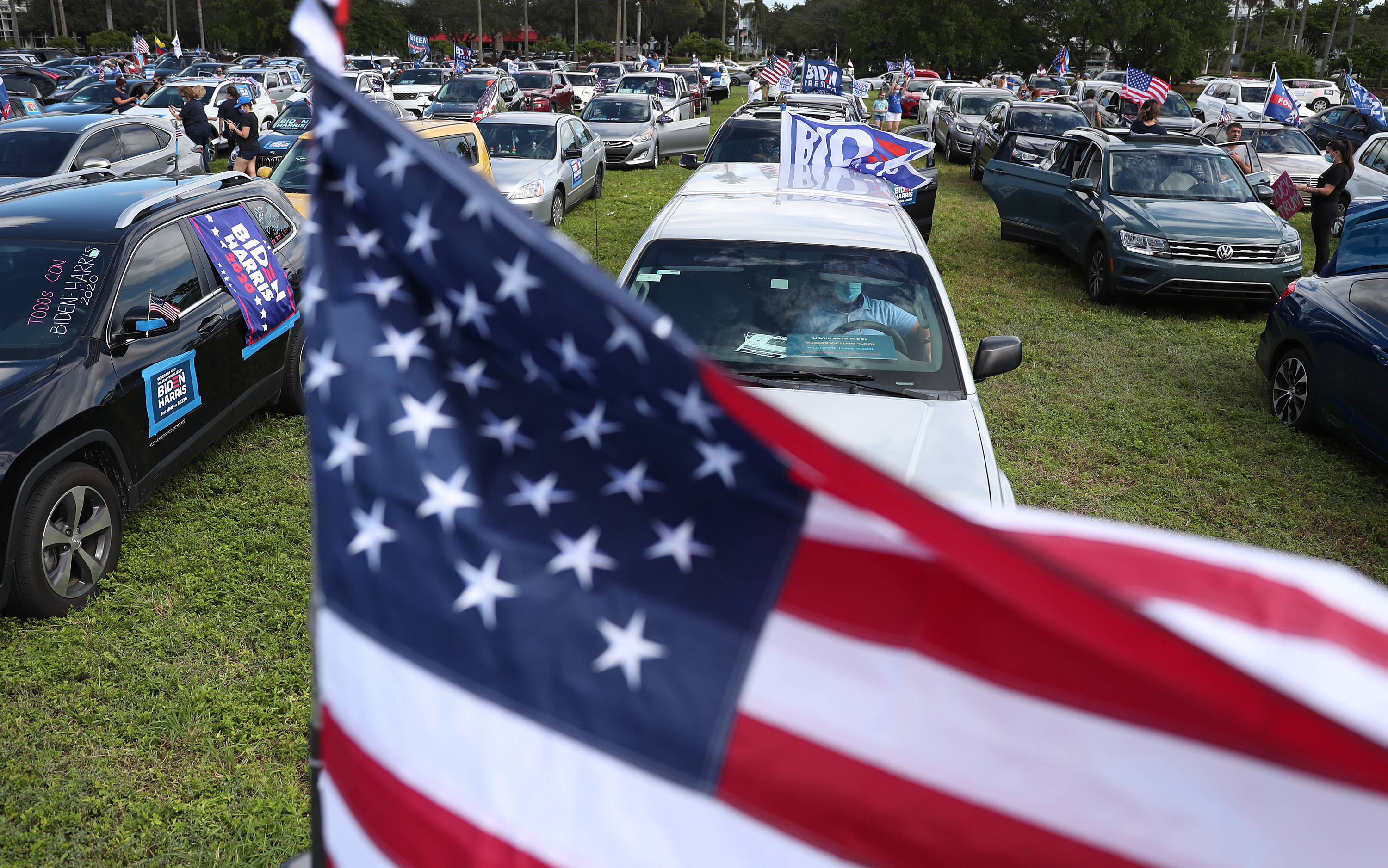
With more than 20,000 Election Day polling places being shuttered nationwide, rampant online misinformation, mail delays, and of course, the coronavirus pandemic still raging, voting in the 2020 election is already hard enough.
But for many Americans, one of the biggest barriers to voting is a simple one: not having a ride to the polls.
Access to transportation is not typically one of the first things people think of when it comes to forms of voter suppression, but advocates say it’s one of the top obstacles people face when trying to cast their vote. In a Harvard study from 2016, 14% of nonvoters said transportation was a “major factor” in why they did not vote in that election.
“You can make a plan, you can register, but not having access to a car to be able to get to the polls is huge, and to be honest, it’s another form of voter suppression,” Crystal Carson, a spokesperson for the voting advocacy group When We All Vote, told BuzzFeed News.
BuzzFeed News has journalists around the US bringing you trustworthy stories on the 2020 Elections. To help keep this news free, become a member.
While city dwellers are typically able to get to their polling place by public transit or on foot, this is less possible for those in rural and suburban areas. And in those areas, the people who don’t own cars are by and large the ones most severely affected by the government’s political decisions: low-income Americans, who are disproportionately Black, Latinx, Indigenous, immigrants, or LGBTQ. The elderly and people with disabilities, who often have physical barriers to driving, and young people, who are less likely to own a car than older generations, also struggle to vote for this reason, advocates told BuzzFeed News.
For at least the past several years, activist groups and rideshare companies have helped alleviate this issue by offering free or discounted rides to the polls. This year, Uber, Lyft, and even the scooter-sharing company Lime are offering deals to help get voters where they need to go.
But that will not be possible this year for Michigan residents, where a decades-old law makes it illegal to provide paid transportation for voters unless they are “physically unable to walk.”
In January, liberal super PAC Priorities USA filed a lawsuit seeking to overturn the state law, which allows for volunteers to drive voters to the polls, but prevents companies such as Uber and Lyft from offering discounts on rides there as they do in the rest of the country. Last month, a judge ruled to uphold the law.
Aneesa McMillan, a spokesperson for Priorities USA, told BuzzFeed News that she expects transportation issues to continue to be a major voting barrier this year. “With such robust voter suppression across the country, which is spearheaded by the RNC and the Trump campaign, it makes transportation all the more important because of the national efforts to limit and restrict access to the ballot,” McMillan said.

A recent study of the 2018 midterm election found that 66% percent of people with access to a car voted, compared to 36% of people who did not have access.
Boston University political science professor Maxwell Palmer, who coauthored the study, told BuzzFeed News this 30-point disparity even held up with people who live in very similar circumstances. “One thing we might wonder is, well, people who have cars might be different in other ways from people who don’t have cars. Like, they might be wealthier, or be employed, or have more resources, things we also know correlate with voting. So how do we know it’s the car itself that matters, and not other socioeconomic conditions that correlate with car ownership?” Palmer said. “So we looked at people who have the exact same street address, say within an apartment building. The people who live in households with cars vote at higher rates than their immediate neighbors in the exact same building without cars.”
Though more people are voting early and by mail than ever this year, Palmer said he remains concerned about how much car access could affect voting, when people may be worried about taking public transit or cabs due to the risk of catching COVID-19.
“Lacking access to a car really does depress turnout,” he said. “And we should really be concerned about that, especially in a situation where lots of other ways to get to a polling place might not be as safe or easy this year.”
Even with access to a car, some voters with physical disabilities may still face obstacles to casting their vote. A Supreme Court ruling on Oct. 21 made drive-up voting illegal in Alabama, and Texas Republicans are trying to shut it down in their state as well.
A substantial percentage of Americans are voting by mail this year, and that includes many who would have otherwise had challenges to make it to the polls in person. But, many people are still choosing to vote in person to ensure their vote is received and counted.
If you have a news tip, we’d like to hear from you. Reach out to us via one of our tip line channels.
Even for those who did opt to vote by absentee ballot, many people are hand-delivering their ballots to drop boxes to avoid mail delays. But that’s still not an easy task depending on how far you live from a ballot drop box.
In Texas, this is a particularly onerous issue, since the state’s Republican Gov. Greg Abbott ordered that there would be only one ballot drop off location per county, meaning many Texans will have to travel long distances to cast their vote.
“In Texas, you could live just a few blocks from your voting location, which makes it feasible, or you could be quite a distance from it,” community organizer Sarah Kovich told BuzzFeed News. “[Texas is] beginning to close down voting locations and moving to larger venues for voting. Well, all of a sudden, what used to be a few blocks walk could now be several miles from your home.”
To combat this, Kovich founded Rideshare2Vote, which provides free rides to voters, both to the polls and to their county ballot box. People in need of rides can call the organization or request a ride on their app, and a volunteer will pick them up and take them there and back.
While the organization supports Democrats, anyone is eligible for a free ride, regardless of what party they support.
Every vote matters! Get your free ride to early vote now: https://t.co/c2uwjr55e1
A wide range of people have used Rideshare2Vote’s services, Kovich said, including younger voters, people who can’t afford a car or gas, visually impaired people, people who use wheelchairs, and even working people with cars who just couldn’t lose their parking spot by going to vote on their lunch break.
The majority of people whom they shuttle to the polls, though, are the elderly.
“We’ve driven a voter one block because she couldn’t walk to her polling location anymore,” Kovich said.
It hasn’t been easy running a volunteer rideshare-to-the-polls operation in the middle of a pandemic, Kovich said. They’ve had to ensure everyone has masks, that only one voter is in the car at a time, the windows are down, the AC is on, and at the end, the driver has to disinfect the car before picking up another voter.
Kovich hopes these rides are a way people can feel welcomed into the process of voting, she said.
“Whoever wants to vote, we want them to know they’re invited,” she said, “And we’ll get them there.”●
